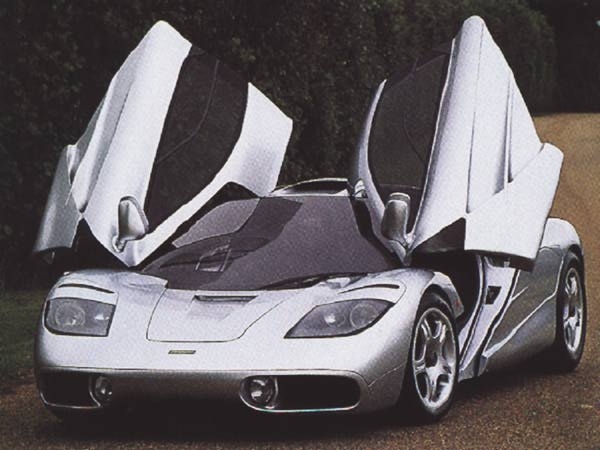With it's massive V-12 370 cu in aluminium engine the Mclaren F1 puts out a n amazing 617 horsepower at 7500 RPMs and a pulse pounding 479 lb. ft of road eating torque.
Utilising the technology derived from years of Formula 1 racing the Mclaren can attain top speeds of over 230 MPH. With the 6 speed manual transmission the mid engine rear wheel drive 2 door coupe is a
force to be reckoned with. The F1 tips the scales at and impressive 2579 lbs. using the advanced unit construction with 2 rubber isolated sub frames and aluminium honeycomb carbon fibre reinforced plastic body panels.
n amazing 617 horsepower at 7500 RPMs and a pulse pounding 479 lb. ft of road eating torque.
Utilising the technology derived from years of Formula 1 racing the Mclaren can attain top speeds of over 230 MPH. With the 6 speed manual transmission the mid engine rear wheel drive 2 door coupe is a
force to be reckoned with. The F1 tips the scales at and impressive 2579 lbs. using the advanced unit construction with 2 rubber isolated sub frames and aluminium honeycomb carbon fibre reinforced plastic body panels.When Mario Andretti test drove the Mclaren at the road and track 7.7 mile oval the test model car had a 7500 rpm limiter on it and at 217.8 mph he had to ease off the gas cause
the wind had kicked up just enough to make the F1 lift from the track!! they later said that the Mclaren was just a kick to drive at any speed.
Such a tractable nature is confirmed by the top-gear acceleration times. Although the engine is only turning 1000 rpm at 30 mph in sixth gear, 50 mph comes up in only 7.0
seconds. From 50 to 70 mph, the engine has picked up enough rpm and torque that the time drops to a mere 3.7 sec onds. A Lamborghini Diablo needs 7.5 seconds to cover the same interval in top gear and the F40 needs 12.2 seconds.
onds. A Lamborghini Diablo needs 7.5 seconds to cover the same interval in top gear and the F40 needs 12.2 seconds.
The advantages of the central driving position are many: the driver can be positioned further forward, his legs slotted between the wheel arches in two long carbon-fibre
beams that house the controls. The relationship with an F1 racing car is obvious. There are no offset pedals, and the tiny, almost-vertical steering wheel is positioned so
the driver's right hand drops from the rim to the alloy gear lever.
 n amazing 617 horsepower at 7500 RPMs and a pulse pounding 479 lb. ft of road eating torque.
Utilising the technology derived from years of Formula 1 racing the Mclaren can attain top speeds of over 230 MPH. With the 6 speed manual transmission the mid engine rear wheel drive 2 door coupe is a
force to be reckoned with. The F1 tips the scales at and impressive 2579 lbs. using the advanced unit construction with 2 rubber isolated sub frames and aluminium honeycomb carbon fibre reinforced plastic body panels.
n amazing 617 horsepower at 7500 RPMs and a pulse pounding 479 lb. ft of road eating torque.
Utilising the technology derived from years of Formula 1 racing the Mclaren can attain top speeds of over 230 MPH. With the 6 speed manual transmission the mid engine rear wheel drive 2 door coupe is a
force to be reckoned with. The F1 tips the scales at and impressive 2579 lbs. using the advanced unit construction with 2 rubber isolated sub frames and aluminium honeycomb carbon fibre reinforced plastic body panels. onds. A Lamborghini Diablo needs 7.5 seconds to cover the same interval in top gear and the F40 needs 12.2 seconds.
onds. A Lamborghini Diablo needs 7.5 seconds to cover the same interval in top gear and the F40 needs 12.2 seconds.